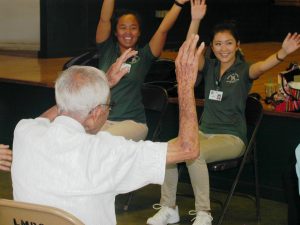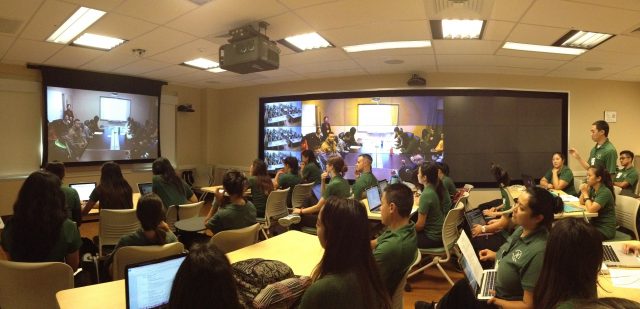Fall 2014 Nursing Highlights
IKE AO PONO, Celebrating More than 250 Native Nurses
As of fall 2014, UH Manoa Nursing’s IKE AO PONO program has helped support the graduation of more than 250 native nurses. This achievement reflects the commitment of the school to social justice through our socio-economic recovery initiative that started in 2001 with 6 Native Hawaiian students.
IKE AO PONO now supports over 150 native students in both undergraduate and graduate nursing programs. IKE AO PONO envisions a lasting improvement, advancement and promotion of health for Native Hawaiian and Pacific Islander communities, and for all peoples of Hawaii and the Pacific, with special attention to at-risk, underrepresented and under-served peoples and communities. IKE AO PONO focuses on three major areas to support the success of undergraduate and graduate native nursing students. The areas include: Outreach, recruitment and skills building; Retention, enrichment, cultural experiences and support services for undergraduate and graduate students; and Community service. In support of the Indigenous Serving University designation of UH Manoa, IKE AO PONO has expanded to include Native American students as well as Native Hawaiian, Samoan, Tongan, Tahitian, Micronesian, Chamorro, and Fijian students.
Within UH Manoa Nursing, IKE AO PONO successfully contributed to Pacific health equity by increasing the number of native nursing students from 1% to 17%. Yet, native nurses make up only 5% of Hawaii’s nursing workforce, and 26% of the population. We have work to do but are making great progress!
The IKE AO PONO program presented at the September 2014 He Huliau Conference organized by the Department of Native Hawaiian Health, UH John A. Burns School of Medicine. Over 300 participants from the Pacific and U.S. mainland presented research and health initiatives on native populations. The cultural exchange highlighted the efforts by indigenous people globally to share their progress with each other in health and education. IKE AO PONO was proud to represent UH Manoa Nursing and our collective achievements.
For more information about the IKE AO PONO program, contact Nalani Minton, director of IKE AO PONO at bminton@hawaii.edu or (808) 956-5504. If you’d like to make a contribution to further the advancement of IKE AO PONO, you can make a secure, online gift at www.uhfoundation.org/IkeAoPonoFund.
Download the poster presentation here.
Students Sponsor Health Fair for Lanakila Senior Citizens
 On November 7, 2014, UHM Nursing students sponsored a health fair at the Lanakila Multipurpose Senior Center. Topics were focused on health promotion for seniors that included osteoporosis, safety, chair yoga for stress reduction, chair Zumba, and blood pressure monitoring. Students prepared posters, handouts, healthy activities, and small give-away items for the 70 seniors who participated.
On November 7, 2014, UHM Nursing students sponsored a health fair at the Lanakila Multipurpose Senior Center. Topics were focused on health promotion for seniors that included osteoporosis, safety, chair yoga for stress reduction, chair Zumba, and blood pressure monitoring. Students prepared posters, handouts, healthy activities, and small give-away items for the 70 seniors who participated.
The seniors were pleased with not only the health promotion information and activities, but also had positive comments regarding the caring attitudes of the nursing students. Due to the success of the health fair, the Lanakila program director has invited UH Manoa Nursing back next fall. The program director asked if UHM Nursing students would continue working with the seniors and offer weekly or monthly health promotion activities. For more information about assisting seniors at the Lanakila Multipurpose Senior Center, please contact Patricia Brooks at pbrooks@hawaii.edu or (808) 956-4169.
Global Connects Bridges UHM Nursing with Students in Japan and China
Senior nursing students connected with nursing schools in two Asian countries during Global Connects, an international exchange activity, as part of their global health studies. Global Connects uses web conferencing to bridge UHM Nursing with students and faculty from the Asia and Pacific Region. Students exchange information and ideas related to global health issues, learning first-hand the perspectives of peers from those regions.

This semester, students connected with the College of Nursing Art and Science at the University of Hyogo in Japan and the Hope School of Nursing in Wuhan, China. Topics of discussion included population-based health care approaches to tuberculosis, stroke, elderly patients, children, rural areas, and natural disasters. Students conducted peer-to-peer exchange, describing risk factors for these issues, as well as common public health interventions undertaken in their home countries.
During Global Connects, the students learned about differences in their countries’ approach to common health problems. They explored cultural influences on health practices and nursing. Furthermore, they learned about global communities by researching information about their exchange partners’ communities, and asking about life as a nursing student. Students commented that the international exchange was an effective way to learn about global health issues and increase cultural awareness. For more information about Global Connects, contact course coordinator Michele Bray at mbray@hawaii.edu or (808) 956-7641.

